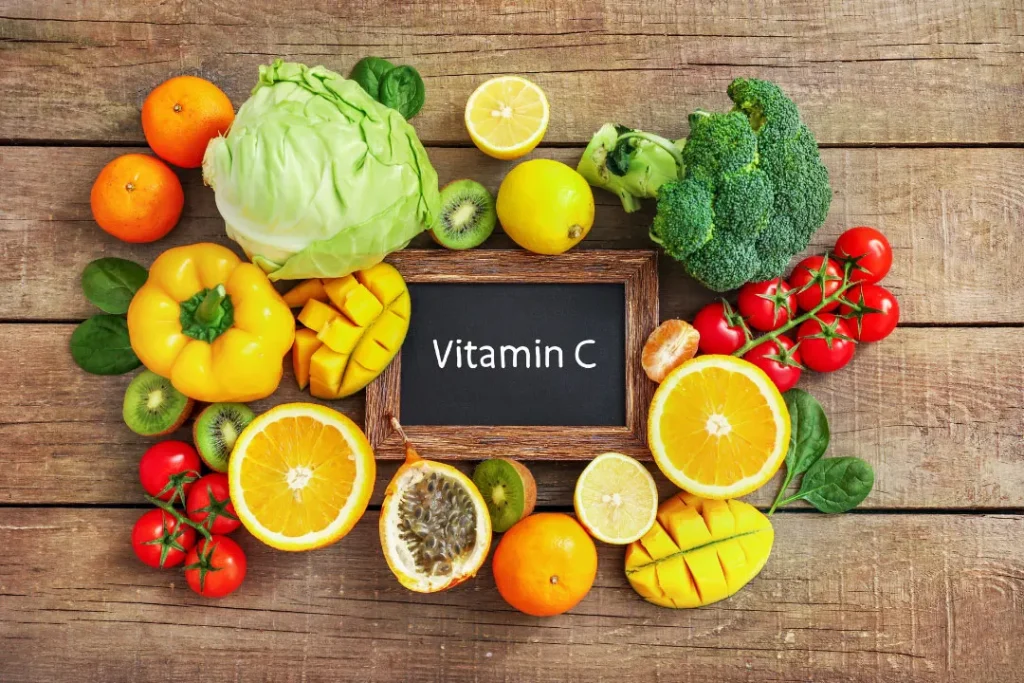Ascorbic acid, another name for vitamin C, is a water-soluble vitamin that is essential for many bodily functions. It is a necessary nutrient that the body cannot produce on its own and it must be obtained through diet. Vitamin C has been shown to have various health benefits including improving immunity, antioxidant effects, skin health, and also cognitive ability. We will examine the nature of vitamin C, its health advantages, the best dosage, any adverse effects, possible drug interactions, and its responsible use in this article.
You May Also Like:
Should You Try CBD for Focus? Here Are the Facts.
Nature of Vitamin C
A water-soluble vitamin, vitamin C can be obtained from a variety of foods, such as citrus fruits, berries, kiwi, broccoli, and peppers. Vitamin C is crucial for the creation of collagen, a structural protein that keeps connective tissues, bones, and the skin healthy. Vitamin C is also a strong antioxidant that guards the body against oxidative stress and the harmful effects of free radicals.

Health Benefits of Vitamin C
1. Immune-Boosting Effects: Vitamin C has been demonstrated to improve the function of immune cells like T cells and B cells, which has been linked to immune-boosting effects. Moreover, you will be less likely to be infected by the flu or the common cold due to strong immunity defense.
2. Antioxidant Effects: Vitamin C is a powerful antioxidant that protects the body against oxidative stress and the destructive effects of free radicals. Also, it lowers the likelihood of developing chronic illnesses like cancer and heart disease.
3. Skin Health: Collagen, a structural protein required for the preservation of healthy skin, is synthesized with the help of vitamin C. Also, it lessens the chance of UV radiation-induced skin damage. Part of this UV protection effect is due to the anti-inflammatory effects of vitamin C.
4. Cardiovascular-Protective Effects: Studies have indicated that vitamin C lowers blood pressure, enhances lipid metabolism, and lessens oxidative stress. These will greatly reduce the stress on the heart.
5. Cognitive-Enhancing Effects: Vitamin C has been demonstrated to improve memory and concentration in older people, It accomplishes this by lowering inflammation and oxidative stress in the brain.

Chemistry of Vitamin C
The chemical name for vitamin C is C6H8O6, and its molecular weight is 176.12 g/mol. It is a chemical that is highly reactive and soluble in water because it can provide and accept electrons. Vitamin C can be rapidly oxidized and hence is frequently utilized as a reducing agent in a variety of chemical processes.
Physiological Mechanism of Action of Vitamin C
Many physiological benefits of vitamin C include anti-inflammatory, immunomodulatory, and antioxidant actions. Vitamin C’s specific mode of action is unknown, although it is thought to entail modulating a number of signaling pathways, including the nuclear factor-kappaB (NF-B), the mitogen-activated protein kinase (MAPK), and the activator protein-1 (AP-1) pathways.
The ability of vitamin C to operate as a powerful antioxidant, decrease inflammation, increase immunological function, modify gene expression, and maybe enhance cognitive function make up the majority of its physiological mechanism of action.

Optimal Dosage of Vitamin C
The best amount of vitamin C to take depends on the person and the desired outcome. Nevertheless, dosages ranging from 500 to 1000 mg daily have been employed in the majority of trials. It is crucial to remember that taking large amounts of vitamin C (more than 2000 mg daily) might cause gastrointestinal adverse effects like diarrhea and nausea.
Side Effects of Vitamin C
When taken in the authorized dosages, vitamin C is usually regarded as safe. High vitamin C doses (more than 2000 mg per day) might, however, cause gastrointestinal adverse effects such as diarrhea and nausea. Kidney stones may develop if high dosages of vitamin C are used over an extended period.

Potential Substance Interactions with Vitamin C
Several drugs, such as aspirin, acetaminophen, and iron supplements, can interact with vitamin C. Aspirin and acetaminophen can decrease vitamin C absorption and effectiveness, but iron supplements can improve vitamin C absorption and cause iron overload in some people.
Best Responsible Use of Vitamin C
It is crucial to pick a high-quality source of vitamin C that is prepared to promote absorption and bioavailability. One of the best sources of vitamin C on the market is myPEAK Wellness, a supplement manufactured by myPEAK Supplements. Its formulation is synergistic and extremely bioavailable. This product is made with BioPerine®, a patented kind of black pepper extract that has been proven to improve nutrient absorption, and each serving contains 1000 mg of vitamin C.
Vitamin C:
Conclusion
Vitamin C or also known as ascorbic acid is a supplement commonly taken to maintain overall health. Vitamin C has immune-boosting effects and enhances the activity of secondary immune cells. Its antioxidant effects can protect the body against the oxidative stress of free radicals. If you are seeking a supplement that can improve your general health and wellness with some nootropic effects, you can look into myPEAK Wellness which is one of the best sources of zinc available in the market. Aside from that myPEAK Wellness also contains a synergistic combination of compounds that can contribute to its bioavailability. However, you must always seek professional advice from registered doctors to determine the dosage of supplements for you.
Important Note: The information contained in this article is for general informational purposes only, and should not be construed as health or medical advice, nor is it intended to diagnose, prevent, treat, or cure any disease or health condition. Before embarking on any diet, fitness regimen, or program of nutritional supplementation, it is advisable to consult your healthcare professional in order to determine its safety and probable efficacy in terms of your individual state of health.
Regarding Nutritional Supplements Or Other Non-Prescription Health Products: If any nutritional supplements or other non-prescription health products are mentioned in the foregoing article, any claims or statements made about them have not been evaluated by the U.S. Food and Drug Administration, and such nutritional supplements or other health products are not intended to diagnose, treat, cure, or prevent any disease.


